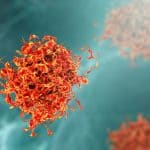Around 3,200 new cases of cervical cancer are diagnosed in the UK every year
A new NHS report has revealed that fewer individuals are taking up potentially life-saving cervical screening invitations and has urged them to do so to prevent cervical cancer.
Every three to five years, the NHS invites eligible individuals for a cervical screening.
Responsible for around 3,200 new cases in the UK annually, cervical cancer is caused by abnormal cells in the lining of the cervix that grow in an uncontrolled way.
The NHS Cervical Screening Programme, England 2022-2023 annual report has revealed that, out of a total of 4.62 million individuals aged 25 to 64 in England who were invited for a screening test between 2022 and 2023, only 3.43 million attended.
Using a test to check for human papillomavirus (HPV), a common group of viruses that is found in over 99% of all cervical cancers, cervical screening saves thousands of lives every year.
For women aged 25 to 64 years, only 68.7% attended a screening within the recommended period of time compared to 69.9% the previous year.
This number was much higher for women aged 50 to 64 years (74.4%) in comparison to those aged 25 to 49 years (65.8%).
The NHS recently pledged to eliminate cervical cancer by 2040, urging people to get the HPV vaccination to prevent invasive strains of the virus that lead to cervical cancer and by increasing cervical screening uptake.
However, the NHS still urges eligible individuals to attend screening appointments, as the vaccine does not provide protection against all types of HPV.
Eliminating cervical cancer within the next two decades relies on “millions of people continuing to come forward for screening and vaccinations every year,” said Steve Russell, chief delivery officer and national director for vaccinations and screening for NHS England.
Nicola Smith, senior health information manager, Cancer Research UK, said: “We encourage women and people with a cervix, such as trans men and non-binary people assigned female at birth, to take part” by booking an appointment at their local GP or some sexual health clinics.










